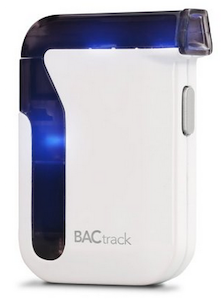 When Steve and I were at CES, we had some audio difficulties with a few of the interviews. In particular we were really disappointed to lose our interview with Stacey Sachs from BACtrack, makers of home breathalyzers. You know I’m a sucker for metrics, so this sounded like a fun product. When I explained to Stacey that we had lost the interview, she offered to send me one of their devices, and I jumped at the chance to do some real world testing.
When Steve and I were at CES, we had some audio difficulties with a few of the interviews. In particular we were really disappointed to lose our interview with Stacey Sachs from BACtrack, makers of home breathalyzers. You know I’m a sucker for metrics, so this sounded like a fun product. When I explained to Stacey that we had lost the interview, she offered to send me one of their devices, and I jumped at the chance to do some real world testing.
BACtrack is named after the acronym BAC, which stands for Blood Alcohol Concentration. The unit I tested is called the BACtrack Mobile Breathalyzer. Before we start using the device, you might be wondering whether the results will be reliable. They said on their website that their products “Meets all standards of an FDA 501(k) approved alcohol screening device”.
I found the government site where you can look up products to see if they meet the 501(k) standards and I found several of the BACtrack devices listed there. I know most people wouldn’t have even checked, but I went a step further and read up on the testing of the device under the decision on whether the FDA would approve. You’d think reading FDA approval documents would be boring but I found some fun stuff. For example, they explained how the BACtrack breathalyzer actually works:
The device employs a fuel cell sensor. An alcohol fuel cell uses an alcohol oxidation reaction. In an alcohol oxidation reaction, a fixed number of electrons are freed per molecule of alcohol. If alcohol is present, a corresponding voltage is generated from the fuel cell, which is proportional to the alcohol content of the breath sample.
That’s pretty cool. The parent company for BACtrack was allowed to do their own consumer study and they were required to determine if people could figure out how to use it accurately and to compare the results to a professional breathalyzer test administered by a trained individual. The BACtrack tests were correlated to 97.2% against the professional breathalyzer, which is good enough for me. If you’re a data and analysis nerd like me you can go read the full results over at the link in the shownotes to accessdata.fda.gov.
I think one of the reasons I was so interested in the FDA approval is that this kind of approval will be necessary on many of the health and fitness devices that are coming out. I know Apple has been in discussion with the FDA about the Apple Watch, for example.
Now that I’ve either a) motivated you to care about the BACtrack breathalyzer, or b) bored you to tears, let’s take a look at the device. BACtrack makes several different models of breathalyzers, the model I am testing is called the BACtrack Mobile. This unit is about half the size of a deck of playing cards and comes in a nice little zippered pouch, suitable to carry in your purse or pocket. It syncs to the BACtrack mobile app on your iOS or Android smartphone via Bluetooth.
I’m a fan of Bluetooth…when it works. So often though, pairing things to Bluetooth is a real hassle. I’m happy to report that all you do is turn on the BACtrack and it pairs to your phone. No secret codes, no turning Bluetooth on and off again. Every time I’ve used it, it connected easily. Steve and I were even able to get both of our phones to see the device at the same time which was surprising.
The app shows the device on screen with an invitation to run a test. You tap the test button and the first thing it does is ask you to guess your Blood Alcohol Concentration. When Stacey was explaining their devices she explained that people really like to be able to guess. If you’re testing yourself, and you get good at predicting the results, then you’ll better understand how alcohol actually affects you since we all have different responses to alcohol.
After you’ve entered your guess, the BACtrack tells you to take a deep breath and shows a pinwheel thing to show you how long to breathe in. Then it tells you to blow into the device while a new wheel goes around. When it’s done (and you’re allowed to breathe again), it does some work and then shows you your Blood Alcohol Concentration level. It couldn’t be easier. After it tells you your Blood Alcohol Concentration, it shows you a graph to tell you when you’ll be sober, or a reading of 0.
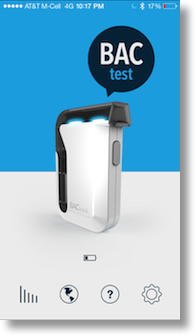
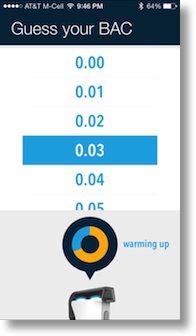
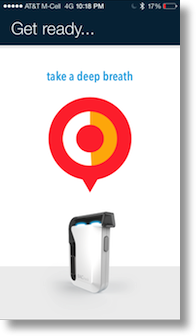
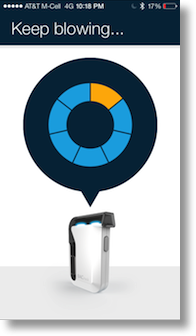
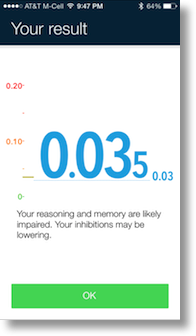
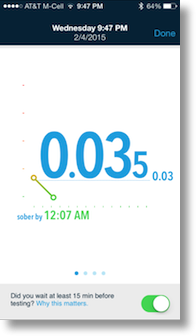
There’s one tricky bit to measuring your Blood Alcohol Concentration, and that’s that you have to wait 15 minutes after you drink anything to get an accurate reading. I had 6 oz of wine over the course of an hour and a half. I took the test without waiting 15 minutes, and while I guessed it might be 0.03, it came back showing 0.26, which is just shy of the level at which their documentation says you will lose consciousness! I waited 15 minutes and it came back with a reading of 0. In other words, pay attention to the instructions and wait the 15 minutes!
You know I’m a giver for the team and all, so you’d think I would have thrown back six drinks in 20 minutes just to give the BACtrack a run for the money but I found I was drinking less and more slowly because I was measuring it, and of course I had to wait 15 minutes to do the test which slowed me down too. You know they say that what you measure you will affect, which is why counting calories and steps works to get fit, so maybe by measuring your Blood Alcohol Concentration, you’ll find yourself drinking less. Not sure if that will be the result but you’ll definitely learn more about how quickly your own body absorbs alcohol.
The BACtrack comes with some interesting documentation, including information on how you should expect to feel at higher and higher Blood Alcohol Concentration measurements. They’re very careful in the documentation to tell you not to use this measurement to determine if it’s safe to drive. I’m sure legally they have to say that but I would think a real measurement of my Blood Alcohol Concentration is more reliable than my brain after a couple of drinks thinking, “I’m FINE!” isn’t it? I understand why they say that though.
Finally if you want even more metrics, you let the BACtrack create logs and make graphs over time of not just your own readings but also for friends (it comes with extra mouthpieces so you can share). The downside to keeping the logs is you have to create an online account, and the data is then stored on their servers. The BACtrack comes with a small brochure explaining their privacy policy and in my scanning I didn’t see anything alarming but it did give me pause to think of my alcohol intake being stored on someone’s servers.
The BACtrack Mobile is $99 (it used to be $129) and the app is free for your phone. Now I have to point out that BACtrack sells a line of lower-priced breathalyzers, called the Elite Series and they’re $50 and under. I did some research and the Elite Series doesn’t use fuel cell technology, it uses a semiconductor sensor instead. I’ll spare you the science, but the thing you need to know is that semiconductor sensor breathalyzers have some downsides. They are less accurate as they’re more sensitive to other substances, like cigarette smoke and perfume. They also need to be calibrated – BACtrack recommends every six months, which sounds kind of painful to me – not even sure where you go to get one calibrated.
If you want to save some money but stay with the fuel cell technology for higher accuracy and reliability they have the BACtrack Element that runs $80 and just shows you your level right on the device.
Remember, just like the only way to be sure you don’t get pregnant is to not have sex, the only way to be sure you’re sober is to have nothing to drink. With that caveat, I think the BACtrack Mobile is a terrific device and will give me metrics to make sure I know precisely whether my driving might be impaired, endangering my life and the lives of others. I included a link to the comparison chart of all the different models over at bactrack.com so you can figure out which one is right for you.

Here’s a free tip from a lawyer.
Just say no. The idea some consumer device, even an accurate consumer device, is going to “clear you to drive” after a party or night on the town is dangerous. If you’ve had enough alcohol to need to test yourself to see if you’re safe, hand over the keys, call a cab, sleep it off, drink two pots of coffee and after you’ve read War and Peace, think about driving.
The only legally definitive alcohol test is from a blood analysis. Even if your gadget says you’re cool to drive, if you’re pulled over, the smell of party on your person could be enough for a ticket, or even a night in the lockup. That your gadget says you’re OK to drive means nothing to the cop or the court. Worse, if you’re charged with causing a wreck with bodily harm.
Now, if you are pulled over, and are to be charged when your confident you’re not intoxicated, the blood test is your friend. Insist on it. It’s the evidence that will protect you and document your sobriety. And well worth the money in that circumstance.
I don’t disagree with a thing you’ve said here, George. The only slight correction is that this IS the pro device, the device/technology that they sell to police departments.
In addition, not in contradiction, I think metrics are a good way to learn. Just like when you first start counting calories you discover that that small handful of peanuts has 300 calories, using this level of Blood Alcohol Concentration tester is a great way to learn how your system metabolizes alcohol. Without metrics like this, it’s as easy to think you’re probably under the legal limit with 3 drinks when in fact you are absolutely not.
I think you make a great point that if you think you NEED to test yourself, you probably should call a cab. I have been enjoying testing it in the comfort of my own home to learn how my body reacts to alcohol, with no intention of driving. Thanks for the perspective, George.
Like you, Allison, I hope I’m not coming across as argumentative, but as participating in an exchange of information and insights.
I referred to the BACTrack Mobile as a “consumer device” not to besmirch its technology but because the day before reading your Google Plus Post I had wandered through Best Buy and saw a display of them next to Fitness Trackers and Electric Toothbrushes.
You did correctly mention the BACTracks need to be calibrated.
A standard set of challenges to “Breathalyzer” evidence is used by lawyers.
Lack of calibration (or inadequate records of calibration) is probably the most likely to prevail. That, and demonstrating the officer administering the test isn’t adequately trained, certified,or correctly follow procedures may win dismissal or acquittal.
The way to get a BACTrack calibrated is to send the company $20 and receive instructions how to ship it to them.
As to self-administering the Breathalyzer test, isn’t it most likely to be done when the user is at diminished capacity? Imagine courts accepting testimony from law officers who administered breathalyzer tests on DUI suspects while themeslves “under the influence.”
Nor are these gadgets “set on the shelf” and forget. They have to go into the “factory” for calibration, depending on model, ever six or twelve months. Then BACTrack warns the fuel cell can dry out, and the owner should refresh it with a moist blow from time to time.
I guess I have visions of these things, sold to consumers, and stashed in purses, glove boxes, jacket pockets, with no attention or maintenance. Like we treat other gadgets, ignoring them until they don’t work.
I also think buyers of these gadgets won’t use them to be sure they haven’t unintentionally gone “over limit,” but to drink as much as they can while not “crossing the line.” Hey, I only blew a .65! Another beer, barkeep!
You do mention metrics. The metric of BAC level to qualify as “under the influence” is a political number.
BACTrack emphasizes use of the device to avoid a DUI conviction, which can be attained by demonstrating BAC level of .08 or more.
So is someone whose BACTrack registers “only” a .75 safe to drive? Their gadget just said “Yes.”
Maybe in addition to drinking, they’re celebrating after an exam taken after an “all nighter,” and are exhausted?
Maybe they took a Benadryl earlier in the day?
Maybe they drank their alcohol with a lot of Red Bull, and the sustaining caffeine buzz wears off on the freeway?
These are some of the reasons a driver could be dangerously impaired, even with a “legal” BAC.
Impairment: it’s a sliding scale, not a simple number.
http://www.cdc.gov/Motorvehiclesafety/impaired_driving/bac.html
Anyway, as I suggested months ago, these devices have the APPEAL of the kind of accuracy expect on from digital watches, calculators, and Excel. I’ve lately spent a lot of time with a family member in the hospital, and even the hospital duty blood pressure gauges and intensive ICU monitors in the hands of well-trained professionals can report very inaccurately. (I finally started telling the tech with one particular (blue) blood pressure device to roll it out and go get one that works.
So whether it’s a heart rate monitor on a fitness band or watch, or a BAC meter that’s out of calibration AND self-administered by an intoxicated party-goer, their INACCURACY should be presumed. And that’s hard to do when they’re flashing what looks like a “hard number” on a digit read out.
Couple of corrections, George. First of all the Fuel Cell units (like the BACtrack Mobile here) do not need to be calibrated and are the same technology sold to the police force (their Pro line). It’s the lower priced units that use Semiconductor Sensors that have to be calibrated for the reasons I list in the blog post.
Secondly you’ve got your decimal place way off. .75 and you’d be long since dead. The legal limit in the US for driving is .08 (Rose says it’s .05 in Australia btw).
The tests done for the FDA approval on this device were with the person who had ingested the alcohol running the test themselves (and then being tested by a professionally-trained tester) when they got 97.2% correlation in the results. So evidently it’s easy enough to do the test even when you’ve been drinking.
You’re absolutely right about my slipped decimal. I’m anxiously awaiting new eyeglasses, but probably just typed the wrong number then didn’t realize (or see) it.
Rose’s comment about Australia is informative. There’s been some effort in the US to lower our “tolerance” to .05, also, but it’s surely stalled by politics:
http://healthland.time.com/2013/05/15/safety-board-recommends-lowering-level-of-legally-drunk/
As to calibration, I’m pretty sure this quote from BACtrac applies to both kinds of sensors:
“How often your breathalyzer needs to be calibrated depends on two things: which BACtrack unit you own, and how often you use it. The Pro Series breathalyzers all have long lasting fuel cell sensors–We recommend that you send them in for calibration about once a year. The Elite Series breathalyzers all have semiconductor sensors, for which we recommend calibration about once every six months.
It’s also worth remembering that if a breathalyzer isn’t used for a long period of time—say, 3-4 months—the sensor can dry out. We suggest that even if you don’t plan on using your breathalyzer for a while, breathe into it at least once a month in order to keep the sensor moist and in good working condition.”
http://support.bactrack.com/customer/portal/articles/839674-how-do-i-know-when-i-need-to-calibrate-my-breathalyzer-
Part of my “theoretical” objection to the nascent industry offering these kind of sensor gadgets to the public is where the gadget interface meets real life.
Getting someone drunk in a lab setting is very different than someone getting drunk in a bar or at a party. Handing a drunk a new and calibrated drunk-o-meter in a lab is very different than a kid woozing out to a car on a dark street, then, whoops, remembering to pull the BACTrac out of his glove box where its been drying out in the Austin sun for weeks.
I am mixed between the side of “knowing you’re over the limit” and “false sense of assurity”. While I agree with Allison that it may be useful to those who drink (I don’t so what dog do I have in this fight?) to see how far gone they may or may not be I also see where it provides a false feeling of “I’m ok!”.
I think as long as BACTrack make every reasonable effort to assure people two things it’s probably a good thing: 1. This device will not hold up in court and 2. If you are on the borderline of intoxicated you should drink a litre of water and listen to some music before getting anywhere near the steering wheel.
Will people dismiss these facts? Yes. Would they even if they didn’t have a BACTracker? Yes.
This is a case where more knowledge is helpful if used properly but some folks refuse to do so in any situation. They give people like that the Darwin Award every year.